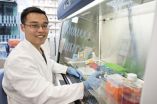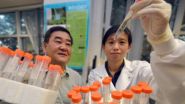(Press-News.org) Irvine, Calif., Sept. 10, 2014 — Brain inflammation can rapidly disrupt our ability to retrieve complex memories of similar but distinct experiences, according to UC Irvine neuroscientists Jennifer Czerniawski and John Guzowski.
Their study – which appears today in the Journal of Neuroscience – specifically identifies how immune system signaling molecules, called cytokines, impair communication among neurons in the hippocampus, an area of the brain critical for discrimination memory. The findings offer insight into why cognitive deficits occurs in people undergoing chemotherapy and those with autoimmune or neurodegenerative diseases.
Moreover, since cytokines are elevated in the brain in each of these conditions, the work suggests potential therapeutic targets to alleviate memory problems in these patients.
"Our research provides the first link among immune system activation, altered neural circuit function and impaired discrimination memory," said Guzowski, the James L. McGaugh Chair in the Neurobiology of Learning & Memory. "The implications may be beneficial for those who have chronic diseases, such as multiple sclerosis, in which memory loss occurs and even for cancer patients."
What he found interesting is that increased cytokine levels in the hippocampus only affected complex discrimination memory, the type that lets us differentiate among generally similar experiences – what we did at work or ate at dinner, for example. A simpler form of memory processed by the hippocampus – which would be akin to remembering where you work – was not altered by brain inflammation.
In the study, Czerniawski, a UCI postdoctoral scholar, exposed rats to two similar but discernable environments over several days. They received a mild foot shock daily in one, making them apprehensive about entering that specific site. Once the rodents showed that they had learned the difference between the two environments, some were given a low dose of a bacterial agent to induce a neuroinflammatory response, leading to cytokine release in the brain. Those animals were then no longer able to distinguish between the two environments.
Afterward, the researchers explored the activity patterns of neurons – the primary cell type for information processing – in the rats' hippocampi using a gene-based cellular imaging method developed in the Guzowski lab. In the rodents that received the bacterial agent (and exhibited memory deterioration), the networks of neurons activated in the two environments were very similar, unlike those in the animals not given the agent (whose memories remained strong). This finding suggests that cytokines impaired recall by disrupting the function of these specific neuron circuits in the hippocampus.
"The cytokines caused the neural network to react as if no learning had taken place," said Guzowski, associate professor of neurobiology & behavior. "The neural circuit activity was back to the pattern seen before learning."
The work may also shed light on a chemotherapy-related mental phenomenon known as "chemo brain," in which cancer patients find it difficult to efficiently process information. UCI neuro-oncologists have found that chemotherapeutic agents destroy stem cells in the brain that would have become neurons for creating and storing memories.
Dr. Daniela Bota, who co-authored that study, is currently collaborating with Guzowski's research group to see if brain inflammation may be another of the underlying causes of "chemo brain" symptoms.
She said they're looking for a simple intervention, such as an anti-inflammatory or steroid drug, that could lessen post-chemo inflammation. Bota will test this approach on patients, pending the outcome of animal studies.
"It will be interesting to see if limiting neuroinflammation will give cancer patients fewer or no problems," she said. "It's a wonderful idea, and it presents a new method to limit brain cell damage, improving quality of life. This is a great example of basic science and clinical ideas coming together to benefit patients."
INFORMATION:
Guzowski and Czerniawski are part of UCI's Center for the Neurobiology of Learning & Memory, which Guzowski directs. The National Institutes of Health supported their research (grants R01 MH08930 and AG00096).
About the University of California, Irvine: Founded in 1965, UCI is ranked first among U.S. universities under 50 years old by the London-based Times Higher Education and is the youngest member of the prestigious Association of American Universities. The campus has produced three Nobel laureates and is known for its academic achievement, premier research, innovation and anteater mascot. Currently under the leadership of interim Chancellor Howard Gillman, UCI has more than 28,000 students and offers 192 degree programs. Located in one of the world's safest and most economically vibrant communities, it's Orange County's second-largest employer, contributing $4.3 billion annually to the local economy.
Media access: UC Irvine maintains an online directory of faculty available as experts to the media at today.uci.edu/resources/experts.php. Radio programs/stations may, for a fee, use an on-campus ISDN line to interview UC Irvine faculty and experts, subject to availability and university approval. For more UC Irvine news, visit news.uci.edu. Additional resources for journalists may be found at communications.uci.edu/for-journalists.
NOTE TO EDITORS: Photo available at
http://news.uci.edu/press-releases/brain-inflammation-dramatically-disrupts-memory-retrieval-networks-uci-study-finds/
Brain inflammation dramatically disrupts memory retrieval networks, UCI study finds
Research sheds light on cognitive losses seen with chemotherapy, autoimmune diseases
2014-09-12
ELSE PRESS RELEASES FROM THIS DATE:
No innocent bystander: Cartilage contributes to arthritis
2014-09-12
Melbourne researchers have discovered that cartilage plays an active role in the destruction and remodelling of joints seen in rheumatoid arthritis, rather than being an 'innocent bystander' as previously thought.
Dr Tommy Liu, Professor Ian Wicks, Dr Kate Lawler, Dr Ben Croker and colleagues from the Walter and Eliza Hall Institute made the discovery while investigating the role of the protein SOCS3 in controlling inflammation during rheumatoid arthritis. The study was published in the journal Arthritis and Rheumatology.
Rheumatoid arthritis affects more than 400,000 ...
A meta-analysis of 3 types of peer norms and their relation with adolescent sexual behavior
2014-09-12
Researchers at Utrecht University and the New York State Psychiatric Institute collaborated on a meta-analysis of research on adolescent sexual behavior. The goal was to analyze how this behavior is related to adolescents' perceptions of three types of sexual peer norms, including how sexually active their peers are, how much their peers would approve of being sexually active, or how much they feel pressured by their peers to have sex. Awareness that these are different ways in which peers can affect adolescents' sexual behaviors is important for parents, teachers, and ...
Protein appears to protect against bone loss in arthritis
2014-09-12
AUGUSTA, Ga. – A small protein named GILZ appears to protect against the bone loss that often accompanies arthritis and its treatment, researchers report.
Arthritis as well as aging prompt the body to make more fat than bone, and the researchers have previously shown GILZ can restore a more youthful, healthy mix. It also tamps down inflammation, a major factor in arthritis.
Now they have early evidence that GILZ might one day be a better treatment option for arthritis patients than widely used synthetic glucocorticoids, which actually increase bone loss, said Dr. Xingming ...
Dendritic cells affect onset and progress of psoriasis
2014-09-12
Different types of dendritic cells in human skin have assorted functions in the early and more advanced stages of psoriasis report researchers in the journal EMBO Molecular Medicine. The scientists suggest that new strategies to regulate the composition of dendritic cells in psoriatic skin lesions might represent an approach for the future treatment of the disease.
"We urgently need new ways to treat psoriasis, treatments that will deliver improved benefits to patients and reduce the incidence of known side effects for existing drugs," says EMBO Member Maria Sibilia, ...
Gray matter matters when measuring our tolerance of risk
2014-09-12
There is a link between our brain structure and our tolerance of risk, new research suggests.
Dr Agnieszka Tymula, an economist at the University of Sydney, is one of the lead authors of a new study that identifies what might be considered the first stable 'biomarker' for financial risk-attitudes.
Using a whole-brain analysis, Dr Tymula and international collaborators found that the grey matter volume of a region in the right posterior parietal cortex was significantly predictive of individual risk attitudes. Men and women with higher grey matter volume in this region ...
Age and diabetes duration linked to risk of death and macrovascular complications
2014-09-12
New research published in Diabetologia (the journal of the European Association for the Study of Diabetes) shows that age (or age at diagnosis) and duration of diabetes disease are linked to the risk of death and marcovascular complications (those in larger blood vessels), whereas only diabetes duration is linked to the risk of microvascular complications (in smaller blood vessels such as those in the eyes). This means younger people with diabetes are more at risk of microvascular complications since they are more likely to have diabetes for longer over their lifetimes ...
The Lancet: Combining gut hormone with insulin proves more effective at controlling type 2 diabetes than other common treatments
2014-09-12
Combined treatment with a drug that mimics the action of a gut hormone and basal insulin [1] is more effective at improving blood sugar control than other anti-diabetic treatments, with similar rates of hypoglycaemia (dangerously low blood sugar levels) and greater weight loss, a systematic review and meta-analysis published in The Lancet shows.
"Achieving normal blood sugar levels in people with type 2 diabetes is compromised by the adverse side effects plaguing currently available treatments. Some anti-diabetic treatments increase risk of hypoglycaemia and weight gain ...
Many kidney failure patients have concerns about pursuing kidney transplantation
2014-09-12
Washington, DC (September 11, 2014) — Concerns about pursuing kidney transplantation are highly prevalent among kidney failure patients, particularly older adults and women, according to a study appearing in an upcoming issue of the Clinical Journal of the American Society of Nephrology (CJASN). Reducing these concerns may help decrease disparities in access to transplantation.
There are thousands of patients with kidney failure who lack access to kidney transplantation, and disparities persist in terms of race, age, sex, and other patient characteristics. To improve ...
Microbes evolve faster than ocean can disperse them
2014-09-12
Two Northeastern University researchers and their international colleagues have created an advanced model aimed at exploring the role of neutral evolution in the biogeographic distribution of ocean microbes.
Their findings were published Thursday in the journal Science. The paper—titled "Biogeographic patterns in ocean microbes emerge in a neutral agent-based model"—was co-authored by Ferdi Hellweger, a microbial ecology expert and an associate professor of civil and environmental engineering; his doctoral student Neil Fredrick, PhD'15; and oceanographer Erik van Sebille ...
Inflammation may be key to diabetes/heart disease link
2014-09-11
Inflammation may be the reason high blood sugar levels damage blood vessels, raising the possibility that anti-inflammatory medications might someday be used to lower the risk of blood vessel disease in people with diabetes, according to a study presented at the American Heart Association's High Blood Pressure Research Scientific Sessions 2014.
"These findings may explain why good blood sugar control is not sufficient to avoid the development of diabetes-induced cardiovascular diseases," said Carlos F. Sánchez-Ferrer, M.D., Ph.D., study author and professor of pharmacology ...
LAST 30 PRESS RELEASES:
New ‘scimitar-crested’ Spinosaurus species discovered in the central Sahara
“Cyborg” pancreatic organoids can monitor the maturation of islet cells
Technique to extract concepts from AI models can help steer and monitor model outputs
Study clarifies the cancer genome in domestic cats
Crested Spinosaurus fossil was aquatic, but lived 1,000 kilometers from the Tethys Sea
MULTI-evolve: Rapid evolution of complex multi-mutant proteins
A new method to steer AI output uncovers vulnerabilities and potential improvements
Why some objects in space look like snowmen
Flickering glacial climate may have shaped early human evolution
First AHA/ACC acute pulmonary embolism guideline: prompt diagnosis and treatment are key
Could “cyborg” transplants replace pancreatic tissue damaged by diabetes?
Hearing a molecule’s solo performance
Justice after trauma? Race, red tape keep sexual assault victims from compensation
Columbia researchers awarded ARPA-H funding to speed diagnosis of lymphatic disorders
James R. Downing, MD, to step down as president and CEO of St. Jude Children’s Research Hospital in late 2026
A remote-controlled CAR-T for safer immunotherapy
UT College of Veterinary Medicine dean elected Fellow of the American Academy of Microbiology
AERA selects 34 exemplary scholars as 2026 Fellows
Similar kinases play distinct roles in the brain
New research takes first step toward advance warnings of space weather
Scientists unlock a massive new ‘color palette’ for biomedical research by synthesizing non-natural amino acids
Brain cells drive endurance gains after exercise
Same-day hospital discharge is safe in selected patients after TAVI
Why do people living at high altitudes have better glucose control? The answer was in plain sight
Red blood cells soak up sugar at high altitude, protecting against diabetes
A new electrolyte points to stronger, safer batteries
Environment: Atmospheric pollution directly linked to rocket re-entry
Targeted radiation therapy improves quality of life outcomes for patients with multiple brain metastases
Cardiovascular events in women with prior cervical high-grade squamous intraepithelial lesion
Transplantation and employment earnings in kidney transplant recipients
[Press-News.org] Brain inflammation dramatically disrupts memory retrieval networks, UCI study findsResearch sheds light on cognitive losses seen with chemotherapy, autoimmune diseases


